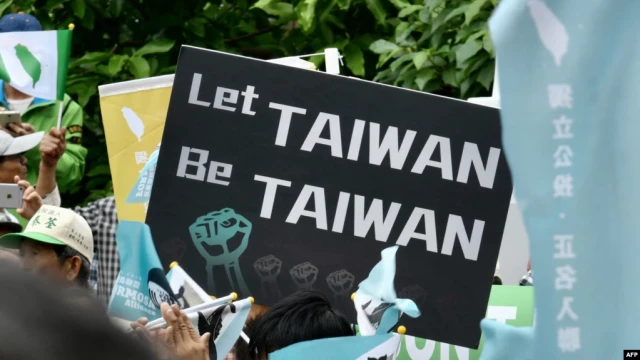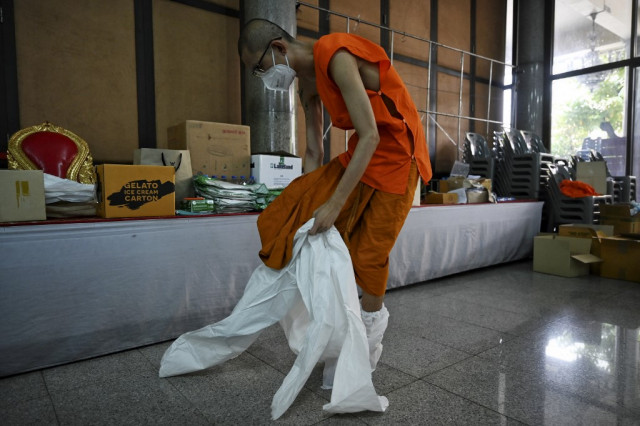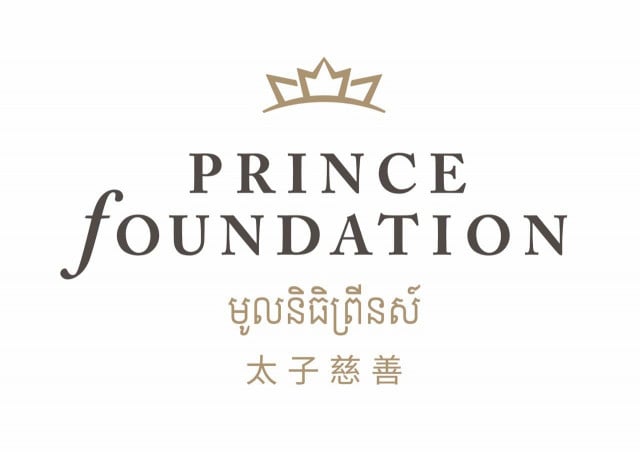Why Western Countries Back Taiwan Despite Their Pro-China Policies

- By Voice of America
- November 15, 2021 5:12 PM
SAN FRANCISCO, CALIFORNIA — Taiwan resident Freddy Lim has noticed his homeland has gotten an unusual amount of high-profile attention from other countries. Over the past four months, officials from two European countries, the European Parliament and the United States have made overtures to Taiwan. Lim, a member of the Taiwan parliament's foreign relations committee, suspects a record was set.
"The reason is that international communication with Taiwan can start being put on the table now," Lim said. "Before, of course, all countries were having communication with Taiwan, but in the past, it was all under the table."
Lim is referring to most of the democratic world's relationship with Taiwan over the years, with a history that goes back decades. China sees self-ruled, democratic Taiwan as part of its territory and has threatened force, if necessary, to bring the island under its flag — a leftover from the Chinese civil war of the 1940s when the Nationalists rebased in Taiwan after losing to the Communists on the mainland. Taiwan has formal diplomatic recognition from just 15 small countries worldwide, although informal relations with other countries do continue.
Western countries' recent dealings with Taiwan serve as a warning to China, Taiwan's longtime political rival, analysts said.
"By pulling together, they have more diplomatic clout and capability to negotiate with China together as opposed (to) on a one-to-one basis, and it's a tactic that's been used throughout history," said Sean Su, an independent political analyst in Taiwan.
Other countries are teaming up in case China pushes too hard against Taiwan, dissenters in Hong Kong, or its own Muslim minority in the Xinjiang region — causes where democratic Western leaders often favor the pushed over the pusher, analysts said.
Surge of diplomatic support
Lithuania agreed in July to allow Taiwan to set up a representative office, leading China to recall its ambassador in Vilnius and warn of "potential consequences." The Czech Republic's senate president took a delegation of 89 leaders to Taiwan in August.
Last month, the European Parliament decided to deepen economic and diplomatic relations with Taiwan. A report that addressed the importance of economic ties between the European Union and Taiwan also raised concerns over China's use of its military to pressure Taiwan.
State media China Daily reported that China's Foreign Ministry spokesman, Wang Wenbin, said the European Parliament's report "violates basic norms governing international relations and the one-China principle, (and) goes against the commitment made by the EU on the Taiwan question."
Taiwan's foreign minister visited Brussels at the end of October. This week, four U.S. senators traveled to Taiwan.
Western leaders have tired of China's "authoritarian" tendencies, said Derek Grossman, senior defense analyst with the U.S.-based Rand Corporation research organization.
"I think what we're seeing with the Lithuanias of the world is sort of a banding together for a common cause, which is, we need to reject the authoritarian model in international affairs," Grossman said. "If it comes to our shores, then it impacts us, or it has the potential to impact us, and that is manifested of course in support for Taiwan."
Eastern European countries such as Lithuania and the Czech Republic have stepped out of the former Soviet Union-leaning East bloc of communist states.
Lithuania's government now wants to "reduce dependence on autocratic regimes and to strengthen our political and economic relations with like-minded partners in the Indo-Pacific region," the Baltic state's Foreign Ministry said in a statement to VOA.
A critical mass of countries acting in Taiwan's favor could help head off any conflict, said Stephen Nagy, senior associate professor of politics and international studies at International Christian University in Tokyo. China's almost daily dispatch of military planes into Taiwan's air defense identification zone since mid-2020 has raised fears offshore of a pending firefight.
Washington, for example, backs Taiwan through arms sales, naval ship passages near its coasts and senior-level visits.
On the peacemaking side, countries voicing support for Taiwan have said they plan to uphold their own "One China" polices, which means recognizing Beijing diplomatically over Taipei.
The Lithuanian Foreign Ministry said it "continues to adhere to a 'One China' policy" while developing relations with the "democratic and like-minded" Taiwan.
"I think we're already seeing the movements towards trying to prevent a conflict between Taiwan and China, and that's sending the strong signals through backdoor diplomacy that the 'One China' policy hasn't shifted and they support peace and stability across the Taiwan Strait and that they don't support either Taiwan independence or a forced reunification," Nagy said.
Threat of Chinese retaliation
In the past, China has struck back at foreign opponents of its territorial interests by stopping military exchanges, halting talks and withdrawing support from its economy, the world's second largest. China seldom opposes informal Taiwan-foreign trade and consular relations, including through de facto government offices, but it usually bristles when political or military exchanges take off.
A spokesperson for Beijing's Taiwan Affairs Office said Monday the Taipei government's "cooperation with external forces and continued 'independence' provocations" were the "root cause" for tension between the two sides, including the sending of a combined 700 Chinese aircraft into the Taiwanese air defense identification zone.
Taiwan President Tsai Ing-wen has said during her five years in office so far that countries that share her "democratic values" should support her.
Foreign countries have priced in China's normal anger as they engage Taiwan, some analysts say. Retaliatory impacts depend on the size and influence of the country, Nagy said. Although China protested to Lithuania, he said, the small nation's economic ties with China are minimal, giving it "more leeway" to act without fear of reprisal.
Countries such as India and Vietnam are eager to back one another economically "to make up the difference" in case of economic reprisals from China, Grossman said. Vietnam and India have spoken out against China over Asian sovereignty disputes.















